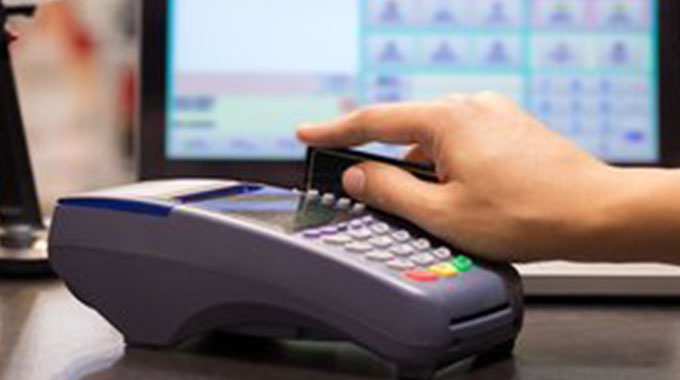Outcry over high POS charges

Oliver Kazunga/Pride Mahlangu, Business Reporters
CONSUMER lobby groups have raised concern over the “exorbitant” Point of Sale (POS) charges banks have recently effected when customers buy goods using debit cards.
The consumer representative bodies have called on the monetary authorities to consider reviewing the charges downwards as it has emerged that some banks were charging as high as $8 per single transaction for purchases above $10.
In separate interviews, officials from the Consumer Council of Zimbabwe (CCZ) and Consumer Rights Association (CRA) raised concern over the POS charges saying a majority of consumers were being fleeced of their low incomes.
CCZ regional manager for Matabeleland Mr Comfort Muchekeza said:
“We wonder where the monetary authority is when consumers are being ripped off in broad daylight. The norm should be every time one wants money, he or she withdraws it from the bank but at the moment, banks don’t have money.
“While banks are failing to give consumers their money, consumers agreed to an arrangement to use their debit cards when transacting but they are now being penalised again for accepting that arrangement through exorbitant POS charges.”
He said the POS fees were more painful on goods that are bought regularly like bread adding that consumers were also forced to swipe many times when they cannot get all products they need under one roof.
“At the end of the month if one would look at the bank statement to see how much were the bank-related charges, they will see that it is now a cost to save your money in the bank, while on the other hand, we are promoting that people should keep their money in the bank.
“We would want to urge the monetary authorities to relook at the issue of bank charges; are the transaction charges justified because consumers have no choice, they have to use swipe,” Mr Muchekeza said.
In recent years, Zimbabwe has been experiencing cash shortages and the Government through the Reserve Bank of Zimbabwe has encouraged the public to use electronic platforms such as POS and mobile money transfer services when transacting to ease the challenge.
As part of efforts to address the prevailing cash shortages, Finance and Economic Development Minister Professor Ncube last week said a further $500 million will be injected into the economy in the first six months of this year to reduce demand for cash in the economy.
The prevailing cash shortages have been exacerbated by some people who are illegally selling cash in the informal market at premiums of up to 50 percent.
A financial market analyst, Mr George Nhepera, said banks have in recent months significantly hiked swipe charges related to use of POS machines mostly found in retail shops.
“Due to cash shortages, the public has resorted to the use of POS in paying for their goods and services, but this has now become expensive as banks have hiked significantly such charges.
“For example, First Capital Bank [formerly Barclays Bank] is now charging $8 for any transaction above $10 once a customer uses POS machines, while CABS is charging $3.
“Imagine if a customer walks into a shop and decides to buy bread currently priced at $18 then unknown to him or her there is POS extra charge of $8. Effectively, the customer would have paid $26 to purchase a loaf of bread,” he said.
Added Mr Nhepera: “This defeats the whole encouragement by the central bank to promote a cashless society in our current environment and has the capacity to further fuel inflation if authorities decide not to intervene.”
In the past, banks used to seek approval from the Reserve Bank of Zimbabwe for review of their bank charges including the POS tariffs but at present its not known if banks were still doing the same judging by the astronomical charges related to POS transactions.
“In line with the upcoming monetary policy, the matter related to POS charges should be addressed as a matter of priority otherwise most of the people will remain being fleeced their hard earned salaries by the banks who should be seen to be making most of their profits from the core business of lending not POS charges,” he said.
RBZ Governor Dr John Mangudya is expected to present this year’s monetary policy statement later this month.
An official employed by FBC Bank who preferred not to be named said his bank recently increased the POS transaction to $4,72 per transaction and the cost could add up to $7 including electronic tax.
“What I noticed is its about $4,72 per transaction of a certain amount which I am not privy to at the moment, so including electronic tax it can add up to $7 per transaction,” said the official.
CRA spokesperson Mr Effie Ncube echoed similar sentiments adding that the heightened POS charges were unjustified, unnecessary, unethical and should be lowered to affordable levels.
“We must not forget that people aretaking home very little disposable incomesbecause of the weakening currency and therising cost of living as well, and from the little that they have, it means banks end up sharing half to half with the consumers who are doing transactions,” he said.
“We believe that the Central Bankshould intervene and ensure that whateverbanks are charging is profitable but not profiteering.
“As I’m giving an illustration if you do five transactions of $20 each and you are paying $8 per purchase it means $40 in a $100 purchase that is almost half of what you transacted going to the bank”.
Mr Ncube also said the exorbitant swiping fees were discouraging the use of the electronic money.
In the past, economists have called on the need to have banking services free of charge to inspire the informal sector to formalise their business by banking proceeds and relying more on plastic money.
Finance and Economic Development Minister Professor Mthuli Ncube has conceded that bank charges were on the high side and suggested banks should give interest to depositors.
Prof Ncube is on record as saying both local and foreign currency accounts should attract interest to encourage more deposits and rebuild confidence in the banking sector.
Recently, some banks maintained tight cash withdrawal limits in a bid to force customers to make as many transactions as possible so that they make money from transaction costs.









Comments